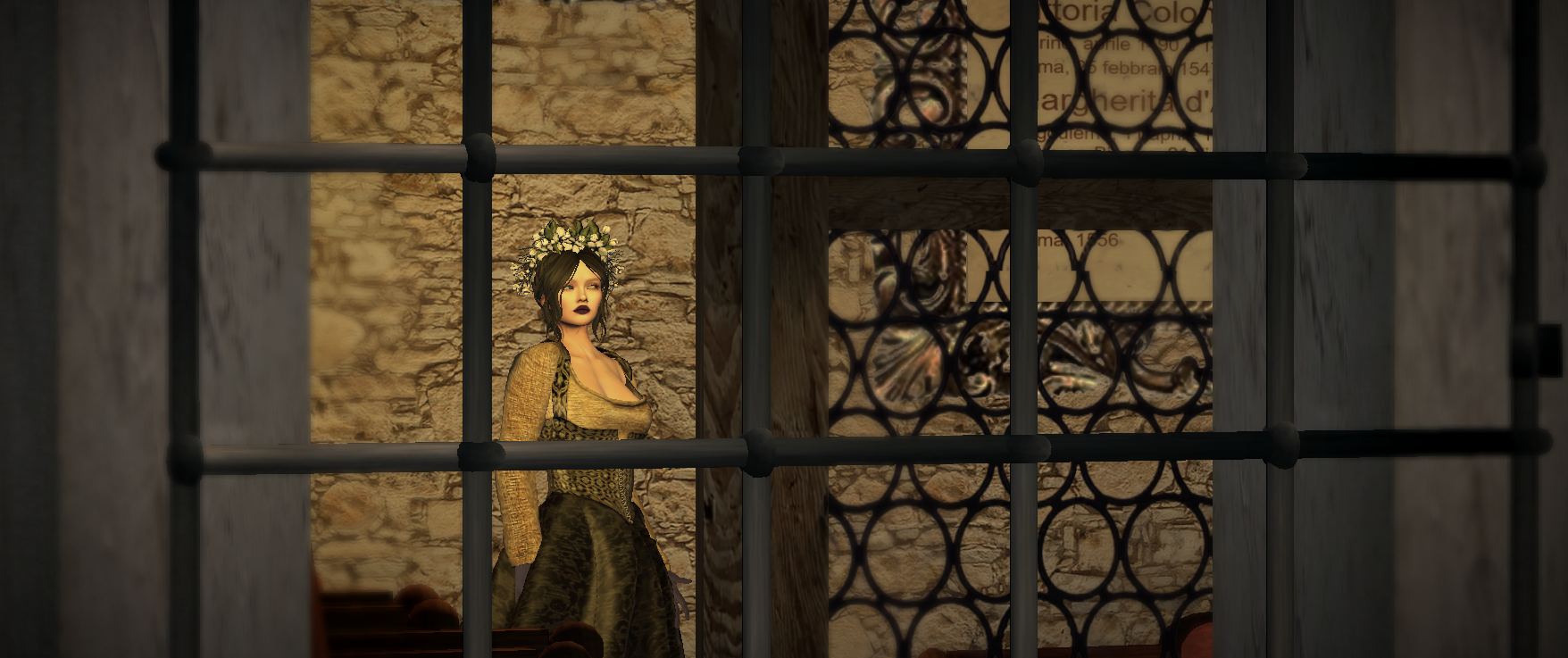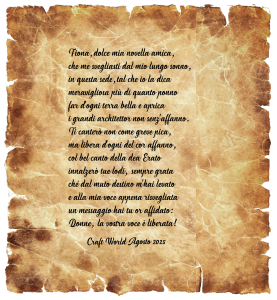I often treat myself to a stroll through its quiet spaces, admiring once again all the precious and patient work of Lorenza Colicigno and Tonino Lane.
I am very fond of NoiLab and the Città delle Donne (City of Women), I love this place, I love them too.
Here, women, poets, writers and visionaries are given life and a voice: souls who have inhabited history, nature and art.
All around me is silent, as if even the air were listening to my every move. I stop, and my gaze wanders towards the hill, where a castle stands, majestic and solitary.
I know who it belongs to: a woman from another time, whose life was short and tormented; confined to her own home, punished for a love that did not exist, accused of having tarnished the family’s honour. An existence walled up in silence. Isabella Morra.
I approach on tiptoe, as one enters a temple or a memory.
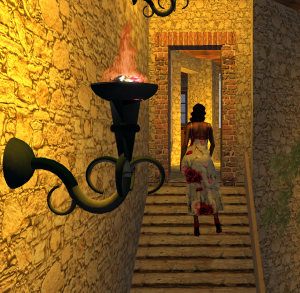 I cross the threshold, and in the chiaroscuro of the hall, a slender figure stands out. Her gaze is veiled by time, her voice the music of a distant century.
I cross the threshold, and in the chiaroscuro of the hall, a slender figure stands out. Her gaze is veiled by time, her voice the music of a distant century.
Isabella: “Oh… a visitor?”
Fiona: “Hello, Isabella. I’ve been hoping to find you for a long time… to talk to you.”
Isabella: ‘I’m not used to hearing a voice other than my own. Where am I? I recognise the walls of my prison, but everything else escapes me… are you a hallucination? Am I dreaming? Who are you?’
Fiona: “No, Isabella, you’re not dreaming. I’m real.
My name is Fiona Saiman and you are in NoiLab, the City of Women, a virtual place within a virtual world called Craft World. The year is 2025, and you are safe here, among friends who want only one thing: for you to live again, for your voice to no longer remain silent.” I pause, then continue gently:
Fiona: “You know… today, after long battles, women have conquered their space — not only in this world, but in all worlds.
However, I must be honest: this is not the case for everyone. There are countries where women are still fighting for their fundamental rights.
But the time in which you lived, with its prejudices and injustices, is now a thing of the past.
You are still present in memory and history: you are a symbol of courage, suffering and resistance, for daring to think and speak.
That’s why I’m here — to finally offer you the chance to express yourself freely, without chains. Would you like to answer a few questions?”
Isabella: ’You’re kind… The City of Women? Just hearing the name opens my heart.
What you say is true: I have never been asked. I have always suffered, never able to truly express myself, except through my verses… which no one read.
But… could we go for a walk together afterwards?
Fiona: “Of course, I promise. It will be an honour for me. Come, let’s go out.” It is a beautiful summer day.
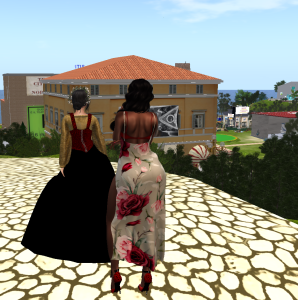 We walk down the avenue, away from the dark castle, towards a flower garden with red benches.
We walk down the avenue, away from the dark castle, towards a flower garden with red benches.
Isabella: “What strange benches… why are they red?”
Fiona: ‘The red benches are a symbol, Isabella. They represent the fight against gender-based violence, particularly femicide.
They are dedicated to women who are no longer with us because of violence.
The red colour recalls blood, but also the void that their absence leaves in the community.”
Isabella looks down, upset by what she has just learned.
Then, once we are sitting next to each other, I smile at her to reassure her. She returns my smile with a shy smile.
Isabella: “What do you want to know, Fiona?”
Fiona: “I know you’ll be surprised to find yourself in a time when we women can read, write and love without asking permission from our fathers or brothers.
How does that make you feel?”
Isabella: “I’m not surprised, I’m trying to understand.
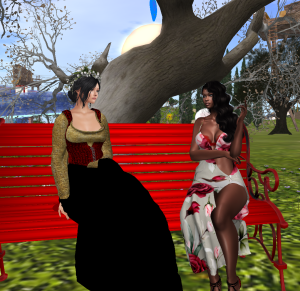 You know, I too had my opportunities to get to know the world, but it was the small world of the Sanseverino court in Saponara, where my brother Giovanni and I had jobs. I was a lady-in-waiting, he was in charge of the gardens.
You know, I too had my opportunities to get to know the world, but it was the small world of the Sanseverino court in Saponara, where my brother Giovanni and I had jobs. I was a lady-in-waiting, he was in charge of the gardens.
That interlude from the silence of Favale Castle was short-lived.
I dreamed of Paris, the French court, where my father and brothers could shine, while I remained in the shadows, a prisoner of a desolate and gossipy place. In places like this, when there is no other centre of interest but people — and especially women — it takes very little to cause a scandal. I did not cause a scandal, Fiona. It was just gossip, because I had befriended a Spanish gentleman and poet. You see, the Morras were pro-French, and the mere fact that I was in contact with a Spaniard was seen as treason.
That invented friendship cost me my life. But now… here, at last, I feel free.
Fiona: “I feel your joy too. But if you had had access to this world, Isabella… with your mind, your voice, your hunger for beauty… what do you think your life would have been like?”
Isabella: ‘My ‘virtual’ world has always been writing, poetry. Thanks to it, I was able to overcome isolation and loneliness.
Even here, at this time, I see myself alone, yet sometimes someone stops to admire the castle.
They observe me, they use the hall for their initiatives, but no one before you had ever sought my gaze. It is a welcome surprise.
Stay with me a while… perhaps we can read my unread verses together.‘
Fiona: ’It is not true that they have never been read. Your words have reached us, your voice, broken but not forgotten, is still alive… would you ever have imagined it?‘
Isabella: ’Yes, I heard it from someone who came to visit the castle and told my story. From the 16th to the 20th century, I had very few readers, but perhaps one was enough for everyone: a certain Giacomo Leopardi. It seems that there are echoes of my words in his poems — my “lonely and strange hell” perhaps inspired his “wild village”.
And thanks to the studies of Benedetto Croce, I have become a symbol of freedom, both for my tragic end and for my poetry.”
Fiona: “And if you could live in this day and age, with a phone in your hand, writing verses, publishing books without asking for approval… would you be tempted or wary?”
Isabella: ‘I never sought a man’s approval. I sought my father’s love, his esteem, and I wanted to shine for what I was worth.
Poetry was my only freedom, even if it cost me my life.
If I were in your time, I would probably look for a publisher who understood my voice. I would publish, go to book fairs, win awards, maybe become famous.
But all that wouldn’t be enough to make me happy, because I know that, in some corner of the world, there will still be an Isabella who dreams of leaving her castle.
Many things have changed, but not for everyone, unfortunately.
Fiona: ‘From prisoner to finally free… if you could talk to a girl who feels lonely, suffocated, unheard today… what would you say to her, you who know the darkness of forced silence?
Isabella: “I would tell her that writing saves. That words are freedom, even when no one listens. That my despair became strength, and that every verse I wrote was a breath snatched from pain. Today I could shout it out, without fear of being judged. I could participate, teach, help other women not to give up.
But I know that even today, people continue to die for their freedom.”
Fiona: ‘And tomorrow, Isabella, what will you do?’
She remains silent. Her lips move slightly, as if to hold back a precious thought. Then she whispers:
Isabella: “I will do what I do best: I will write a sonnet. A sonnet dedicated to you. When you return, you will find it on these walls, among my other verses, but now… come on, let’s go for a walk. You promised me.‘
Smiling like a child waiting for her gift, she stands up and holds out her hand to me. I take it and we set off.
Isabella: ’I’ll write it, and we’ll hang it in the hall.”
Fiona: “You know, Lorenza let me read your verses. During an event, I impersonated you: I wore your clothes, styled my hair like yours, and in doing so, I felt all your sadness and frustration at your unfair fate. If I were in your place, I would have rebelled… and perhaps I would have died too. I realise that Isabella is no longer listening to me, her gaze lost on the horizon, as if she were far away. I don’t disturb her: perhaps she is already creating the sonnet for me. None other than Isabella Morra herself will write for me!
We walk in silence. The questions are over, but many still arise within me. I follow the rhythm of her steps; every now and then she stops, looks at me and smiles.
She seems to finally want to fly, free, in the wind, when suddenly she whispers softly, like a chant:
“No more bars, no more walls, no more silence.”
The next day, I return to see her. I don’t find her. I smile — perhaps she is walking around NoiLab, finally in control of her own time. But in her place, on the wall of the hall, there is a parchment.
I approach, my heart in my throat. It is a sonnet, signed by her, complete with a dedication: “A gift of friendship. A voice rediscovered” Isabella Morra.
To enter the Metaverse of Craft-World and visit NoiLab, you need software. We recommend Firestorm OS, which you can download HERE and then choose according to your operating system.

